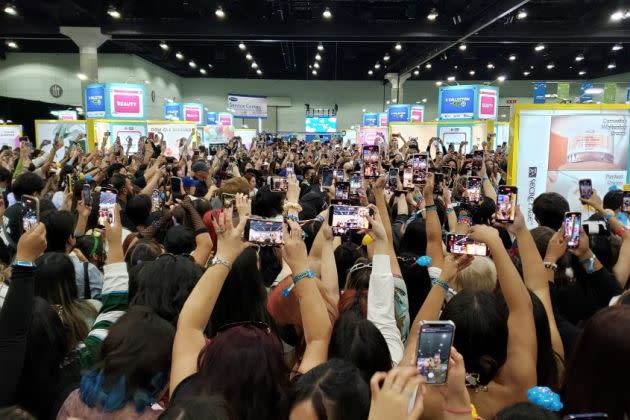KCON LA: Experts Explain the Global Explosion of K-Pop and the Issues Ahead for Long-Term Dominance

Thousands of excited and knowledgeable fans on the floor of the Los Angeles Convention Center for KCON LA would dispel any doubt that K-Pop and Korean culture have become major phenomena in America. But such raw energy must surely burn itself out. Right?
Two high-profile U.S. academicswere on hand on the sidelines of this weekend’s K-culture confab to offer high-minded analytical of the current Korean wave and suggest ways in which it may be made sustainable.
More from Variety
Korean Pop-Culture Fest KCON LA Wraps on Musical High Note After Blending Online and Offline Worlds
Scooter Braun Joins Japanese Talent Show '&Audition - The Howling'
The Unexpected Connection Between K-Pop's BTS and Country Duo Sunset West
Kim Suk-young, a professor at the UCLA School of Theater, Film and Television, explained that K-Pop is closely in tune with Gen-Z, generally defined as people born between 1995 and 2010. YouTube, TikTok and online fandom all work as perfect vectors with this group of digital natives.
Kim also characterizes Gen-Z as idealistic, inspirational and welcoming of globalization, meaning that they are open to global culture, the ideals of free trade, borderless societies and unlimited online consumption. They are also socially liberal, but fiscally moderate or conservative. Korean pop culture plays to many of these themes with its emphasis on “small things in exquisite harmony and looking lovely,” says Kim.
“To take a look at a BTS video, you’ll see so many cute gestures and lyrics about the pleasure of spending today, because the future is futile. [What could be seen as] a satire about a bleak future is sublimated as cute and affective. Healing,” says Kim.
Why Korean culture, rather than culture from other countries, has mushroomed may explain its potential for sustainability.
“Korean is a mid-sized power. It is economically advanced, but without an imperial past. The Korean brand has underdog power,” she says. “And for cultural sensitivity.” Even multi-species sensitivity and kinship.
She points to “Extraordinary Attorney Woo,” a recent series hit which streamed on Netflix. “Whenever the [autistic] heroine has an insightful breakthrough, she conjures up whales and dolphins,” says Kim.
The first season of “Squid Game,” Netflix’s biggest hit of all time, was successful because of its study of human relationships, Kim argues. That is in tune with Korean culture and brands which are “accessible, vocalize social justice and a network effect.”
Sam Richards, professor at Penn State University, describes a “magic mixture” that is currently making Korean pop culture successful, part of which is its lack of overt sex or violence.
“It is not revealing, explicit, gratuitous, or in your face. Sex is rarely shown and not discussed. A lot of people appreciate this. Most people in the world are shy” says Richards. “Indian people’s conceptualization of sex is much closer to Korea than to that of America.”
And while violent was an adjective frequently used to describe “Squid Game” Richards says simply, “Can you imagine what ‘Squid Game’ would have looked like if it had been made in the U.S.?”
But Richards also warns that Korean pop culture will need to evolve if its success is to have a long-term future.
Richards is critical of the Korean pop industry’s high burn rate. The profit model is largely about introducing new acts and hinders long-term fan engagement with any particular Korean musician. The problem of “aging out makes it difficult for anyone 25 years old or more to follow Korean music, if it is constantly being reinvented,” Richards says.
Even bigger issues loom, says Richards. Korea will have to deal with climate change (“so big that we can’t visualize it”), demographics that make Korea a shrinking and fast-aging society and social inequality.
Social injustice themes have made for entertainment value in multi-Oscar-winning Korean movie “Parasite” and in “Squid Game,” but the problem detracts from Korea as a role model.
“Korean sophistication is one of the things that attract us about Korean culture. There is almost nothing negative about [South] Korea. But when inequality in Korea grows, Korean culture will lose its luster,” says Richards.
And as K-pop acts seek a wider appeal through the inclusion of non-Korean band members, there may be societal pushback. That is a problem that parallels the resistance to immigration as a tool to deal with an aging population.
“There are so many opportunities to not follow the Hollywood model of sex and violence. But don’t make the mistake of generalizing to a population you don’t understand,” said Richards, when trying to define a way of keeping Korean culture popular.
Best of Variety
From 'The Sandman' to 'Blonde': Books Made Into Movies and TV Series That You Should Read
Jennette McCurdy's Provocative Book 'I'm Glad My Mom Died' Is Already a No. 1 Bestseller
Sign up for Variety’s Newsletter. For the latest news, follow us on Facebook, Twitter, and Instagram.